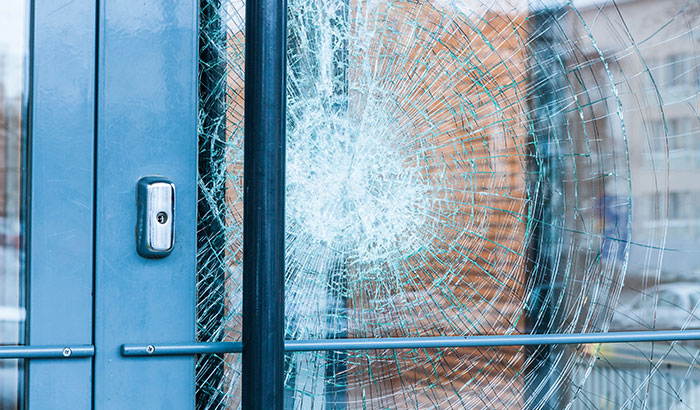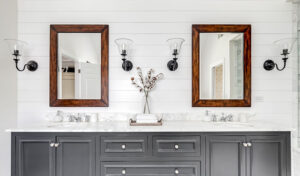Everyone notices when glass shatters, but what causes it to shatter by itself? Spontaneous shattered glass can be a safety hazard. Not only that, but glass suddenly shattering without any explanation can also be scary! With glass shards all over the floor, it’s stressful for everyone involved, whether at home or in a work setting.
As it turns out, you’re not alone if you’ve seen glass shatter on its own. It’s a phenomenon that happens, and there’s a reason for it.
In this blog, we’ll explore the most popular types of glass, what causes them to shatter on their own, and provide some tips on how to prevent shattering. Keep reading to learn more!
Most Popular Types of Glass
Tempered, laminated, and annealed glass are the most popular types of glass available today. They vary in strength and use, making it important to understand the differences between them to get the best option for your home.
1. Tempered Glass:
Tempered glass is processed with thermal or chemical treatments to increase its strength and shatter resistance. The tempering process leaves the outer surface of the glass in a state of compression and the interior in a condition of tension, making it more resistant to impact and thermal stress.
Tempered glass is typically 4-5 times stronger than annealed glass of the same thickness, and it can withstand high levels of pressure and impact without breaking.
2. Laminated Glass:
Laminated glass is a type of safety glass made by sandwiching a layer of polyvinyl butyral (PVB) or ethylene-vinyl acetate (EVA) between two or more layers of glass. The PVB or EVA layer acts as an adhesive, bonding the glass layers together and preventing them from shattering into sharp pieces if they are broken.
Laminated glass is generally stronger and more impact-resistant than annealed glass; it can also provide additional benefits like sound insulation and UV protection. The strength of laminated glass can vary depending on the number and thickness of the glass layers and the type and thickness of the interlayer material used.
Laminated glass is less susceptible to shattering by itself than annealed glass, thanks to its sandwiched construction and the PVB or EVA interlayer.
3. Annealed Glass:
Annealed glass is a type of glass that has been cooled slowly to relieve internal stresses introduced during the manufacturing process.
Unlike tempered or laminated glass, annealed glass is not treated to increase its strength or shatter resistance. As a result, annealed glass is generally weaker and more susceptible to breakage than tempered or laminated glass.
Annealed glass can also be more susceptible to shattering by itself than tempered or laminated glass. This is because it can contain internal stresses that cause it to break under certain conditions, like temperature changes or exposure to mechanical stress.
Inadequately annealed glass is particularly susceptible to spontaneous breakage, as it can contain residual stresses that cause it to break without any external force.
What Causes Glass to Shatter By Itself?
We’ve all witnessed that moment when glass shatters all by itself. Shattered glass is usually due to thermal stress, mechanical stress, frame-related damage, chemical reactions, or manufacturing defects. Let’s take a closer look at how these forces cause the glass to shatter.
Thermal Stress:
Because glass is a poor conductor of heat, thermal stress can cause it to shatter by itself. It expands and contracts at a slower rate than the air around it.
When glass is exposed to a sudden temperature change, such as moving from a cold environment to a hot environment or vice versa, different parts of the glass will expand and contract at different rates. This creates stress points in the glass, which can cause it to crack or shatter.
For example, if you take a glass dish out of the refrigerator and place it directly into a hot oven, the sudden temperature change can cause thermal stress in the glass. The bottom of the dish, which is in contact with the hot oven, will expand rapidly, while the top of the container, which is still cold, will not. This is what creates those stress points that lead to cracking or shattering.
Similarly, if you pour hot water into a cold glass, the inside of the glass will expand rapidly while the outside remains cool. This can create stress points in the glass, which can cause it to crack or shatter.
It’s important to note that thermal stress can also occur due to uneven heating or cooling of the glass. For example, if a glass is heated unevenly, such as placing it on a hot surface on only one side, it can also create stress points in the glass and cause it to shatter.
The same principle applies to any type of glass exposed to thermal stress. For a glass door, being placed too close to a vent could have the same unfortunate effect.

Mechanical Stress:
Mechanical stress can cause the glass to shatter by itself because it creates an internal tension that can exceed the strength of the glass. Mechanical stress can be generated in glass due to the annealing process and variations in chemical composition within a melt.
When glass is subjected to mechanical stress, it can cause it to crack or shatter. For example, if a glass door is slammed too hard or if a hard object hits a glass panel, this can create stress points in the glass. Over time, these stress points can cause the glass to weaken and eventually shatter on its own.
It’s worth noting that glass is a brittle material and is not as strong as other materials like metal or plastic, making it more susceptible to mechanical stress.
Frame-related Damage:
Frame-related damage is a common cause of spontaneous glass shattering, particularly in tempered glass. When glass is installed in a frame, it is held in place by pressure from the frame. If the glass expands and contracts due to changes in temperature, and there is no space within the frame to accommodate this movement, the stress can cause the glass to shatter.
Chemical Reactions:
While chemical reactions are not a common cause of glass shattering, certain chemicals can cause glass to break down and weaken over time. For example, hydrofluoric acid can react with the silicon dioxide in glass, causing it to dissolve and weaken. This weakening can eventually cause the glass to shatter, even without any external stresses.
Another way that chemical reactions can cause the glass to shatter is through the presence of nickel sulfide inclusions, which we’ll discuss more in the next section.
Manufacturing Defects:
Manufacturing defects in glass can cause it to shatter spontaneously due to internal defects or impurities that weaken the glass structure.
Nickel Sulfide Inclusions:
The most common cause of spontaneous glass breakage is internal defects within the glass, such as nickel sulfide inclusions. These inclusions can cause the glass to shatter without warning, as the stress on the glass exceeds its strength.
Nickel sulfide inclusions are formed when nickel and sulfur are present in the raw materials used to make glass. During manufacturing, these elements can combine to form tiny particles of nickel sulfide that become trapped within the glass.
While these inclusions are usually very small and not visible to the naked eye, they can significantly impact the strength and integrity of the glass.
Over time, nickel sulfide inclusions can cause the glass to weaken and become more susceptible to shattering due to the internal stress points within the glass. They can exceed the strength of the surrounding material. When this happens, the glass can shatter spontaneously, even if it has not been subjected to any external stresses.
To minimize the risk of spontaneous glass breakage due to nickel sulfide inclusions, manufacturers may use special techniques to detect and remove any inclusions before the glass is tempered or installed.
However, detecting or removing all inclusions is not always possible, and spontaneous glass breakage can still occur in some cases.
Residual Surface Compression:
Residual surface compression is another common manufacturing defect that can cause the glass to shatter spontaneously. When glass is tempered, it is heated and then rapidly cooled to create surface compression, which makes it stronger.
However, if the cooling process is not uniform, it can create areas of residual surface compression that can cause the glass to shatter without warning.
Tips to Keep Glass From Breaking
While glass shatters on its own sometimes, you can take plenty of preventative measures to prevent this phenomenon from happening. After all, no one wants shattered glass in their home or business if it can be prevented. Some tips include:
- Avoid installing glass in areas directly exposed to sunlight or extreme temperature changes. Examples include heating or cooling vents.
- Use tempered or laminated glass instead of annealed glass in areas where safety is a concern, such as windows and doors.
- Make sure that the glass is installed correctly and supported, with no gaps or pressure points that could put stress on the glass.
- Avoid hitting or striking the glass with hard or sharp objects, and be careful when moving or handling large glass panels.
- Regularly inspect the glass for any signs of damage or stress, such as cracks, chips, or scratches, and replace any damaged glass immediately.
- If you notice any unusual noises or vibrations coming from the glass, such as popping or creaking sounds, contact a professional to inspect the glass and identify any potential issues.
- Consider using a protective film or coating on the glass to help prevent breakage and reduce the risk of injury in case of breakage.
- If you have double-paned windows, ensure that the seals are intact and that there is no moisture or condensation between the panes, as this can cause stress on the glass and lead to breakage.
- If you have pets or children, consider using safety gates or barriers to prevent them from coming into contact with glass surfaces and potentially causing damage or breakage.
How to Respond When Glass Shatters On Its Own
While prevention is key to avoiding spontaneous glass breakage, accidents can still happen. If you find yourself faced with unexpected glass breakage, it’s important to respond quickly and safely to minimize the risk of injury and damage.
Let’s look at some steps you can take to respond to spontaneous glass breakage and ensure that the glass is properly repaired or replaced.
- Stay away from the broken glass to avoid injury. If there are any sharp or jagged pieces of glass, do not attempt to pick them up or move them with your bare hands.
- If the glass is in a high-traffic area or poses a safety hazard, cordon off the area with caution tape or other barriers to prevent others from coming into contact with the broken glass.
- If the glass is in a window or door, cover the opening with a piece of cardboard or other material to prevent drafts and keep out debris.
- Call a professional to assess the damage and determine the best course of action. Depending on the severity of the breakage and the type of glass involved, the glass may need to be replaced or repaired.
- If the glass is in a car, follow the manufacturer’s guidelines for dealing with broken glass and contact a professional auto glass repair service to replace the glass.
Get Your Glass From Murray Glass
No matter what type of glass you need for your home, Murray Glass has it. From windows and shelving to doors and mirrors, we provide custom options for your home or business.
Our glass is strong and sturdy and unlikely to shatter on its own. But in the strange event that it does, we also offer glass repair services, including 24/7 emergency service. You can rest assured knowing you’re getting high-quality glass that will stand the test of time.
Call us at 801.262.3364 or fill out the form on our website to schedule your free consultation, and let us know if you have any questions. Let Murray Glass outfit your home or business!





